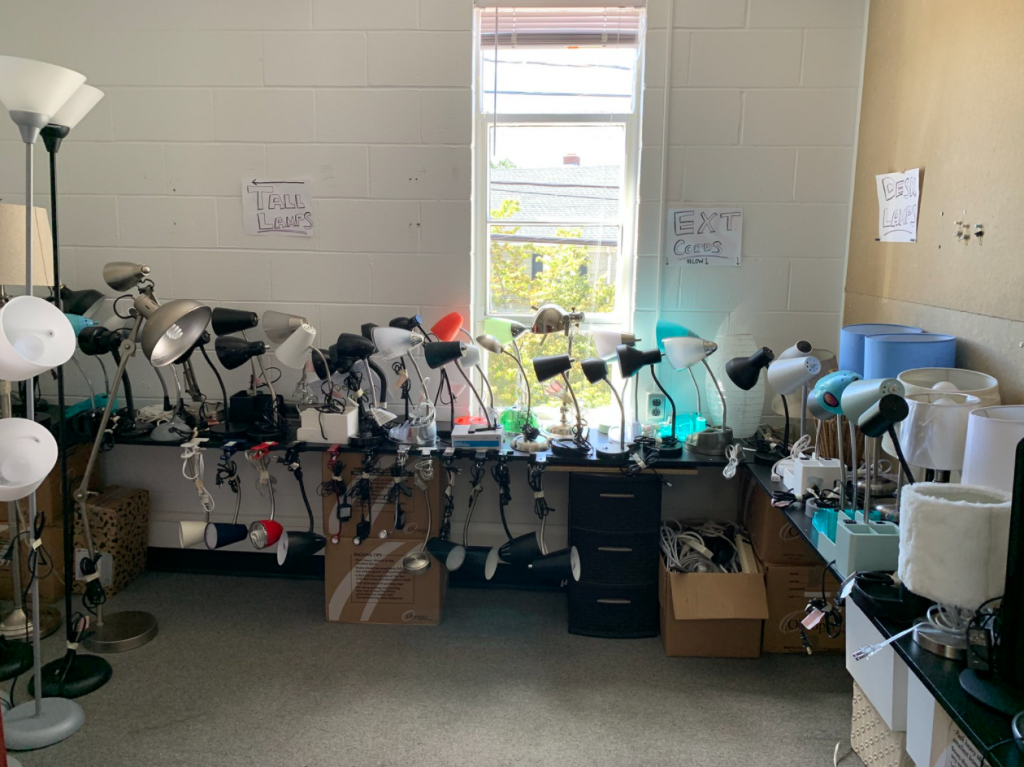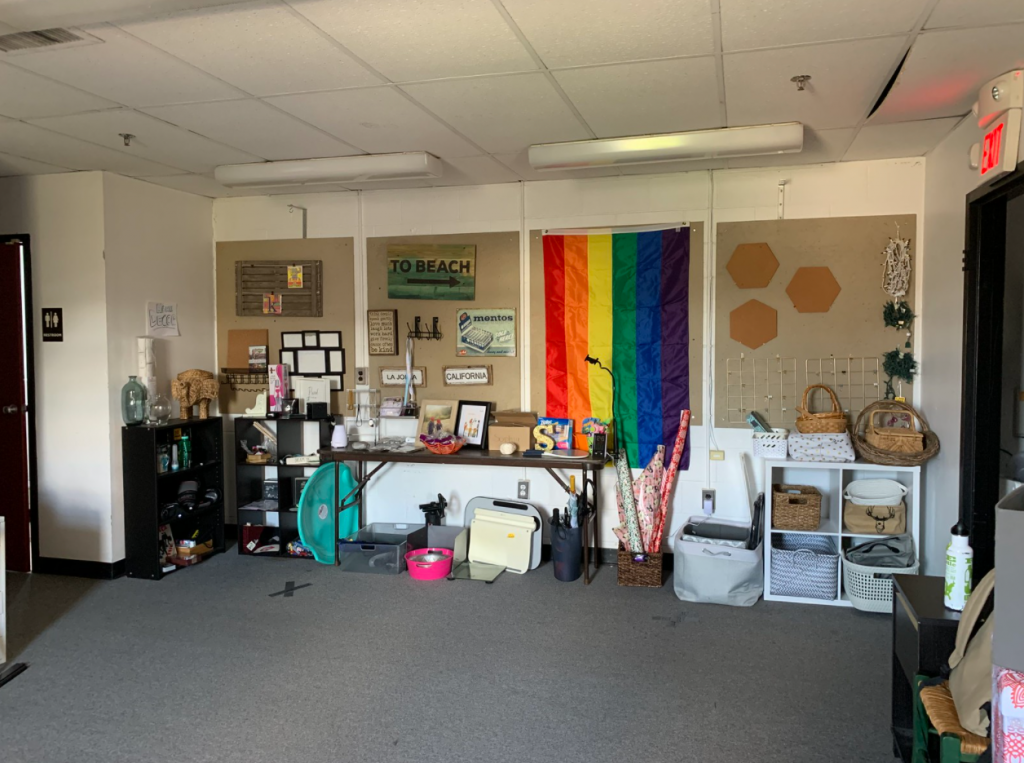Kristen Kaufman and Carly Thibodeau
What we do, and why it’s important

When students move out of college campuses, they discard items they do not need or want anymore, most of them in good reusable condition. To prevent tons (literally- Tons!) of salvageable waste from ending up in landfills and incinerators, the Office of Sustainability (OOS) facilitates a campus reuse economy through our Trash to Treasures program.
This includes collecting donations during Move Out in the spring and giving them back to students during fall Move-In through our Back to School Sale. To make this happen, we collaborate with a range of campus partners, including Facilities, the Office of Residential Life and Learning, and the FIRST Resource Center.
“Closing the Loop” (also sometimes called “Cradle to Cradle”) is the idea of moving from a linear production system to a circular system. In the traditional linear economy, products are made, used, and then disposed of— often in landfills, which can be harmful sources of pollution to their local environments and communities. Products are born, and when they are disposed of, they “die” (“Cradle to Grave”). In a circular system, items are reused or transformed to be reborn again. So, rather than moving in a line from creation straight to a landfill, products complete a full circle of being made, used, and then used or remade again.
Collecting Move Out donations
In the midst of the onset of the COVID-19 pandemic, the move-out program went a little differently this year. Despite challenges, it was a success! Read more about 2020’s March Move-out madness and our impromptu May Move Out Day here.
Gearing up for the Back to School Sale
At the end of the spring semester and our May Move Out Day, we were eager to enjoy the summer outdoors. But alas, treasure calls! After a few months to decompress, in August we kicked back into gear to organize the sale.
As the pandemic raged on, the first step was to develop protocol for how to safely plan and run the sale. We contacted covid19@tufts.edu, the one-stop-shop for questions about COVID and Tufts, to develop guidelines for if and how we could safely run the sale.
Once we had our protocol, we hired on-call student recycling workers to help prepare the sale. This included 9 student recycling workers, who worked a total of 92 hours over 10 shifts that spanned a week-long period. Though the donations had been sitting in storage untouched for most of the summer (so that any virus would have died), we provided student recycling workers with access to a range of PPE items, including gloves, aprons, goggles, and tongs. In addition to wearing masks as required, most workers also opted to wear gloves. Hand sanitizer was also made available.
The first thing we did as a team was sort all of the donations we’d collected. We had already initiated a rough sorting system at the end of Move Out when we counted and weighed the donation items to gather data on each donation category. Now, however, it was time to be a little more thoughtful. We sharpened the categories into sub-categories, turning broad categories such as kitchenware and toiletries into sub-categories such as keurigs and pots, or feminine hygiene products and shower caddies. In doing so, we identified items that were either broken or of such poor quality that they were not salvageable and discarded of them.

As we cleaned, sorted, and even laundered items (thanks to Event and Conference Services for lending us their van!), we began to think strategically about which categories should go where. Our space was the second floor of 550 Boston Ave, where there are a few different rooms—some were small and office-sized and some were large and open. Together we created a map and began setting everything up in its spot. The student recycling workers were a great help for this—some even had retail experience and were able to creatively arrange our items for a polished store appearance.
For photos of this year’s sale, view our Flickr album.
Running the Sale
While preparing donations, we made a plan and timeline for the sale. Scheduling was tricky. Due to COVID, students were arriving to campus in waves: one wave for out-of-region students, and then another wave for in-region students two weeks later, after out-of-region students had been tested and were out of quarantine. We decided to open in two waves based on the move-in and quarantine schedule. Similar to 2019, we opened up the sale exclusively for FIRST Resource Center students first and gave almost everything away. Only on the last day of the last wave did we price items more expansively and open up for the rest of the Tufts student body.
Once all the donations were set up for the sale, the campus planner came to assess the space. We marked the floors for social distancing and determined both the COVID-safe building capacity as well as the capacity for individual rooms. The student recycling workers spent the final day making signs for the sale categories and sections, room occupancy, and social distancing markers.
Finally, it was time to open! Eco-Reps helped to greet students and run the sale. At the entrance to the sale, all students were required to show us a negative COVID test result from Tufts to confirm they had been approved to leave quarantine. To ensure the sale was as equitable as possible given the scheduling challenges and restraints, we restricted shoppers to one item from each category so that folks who could not attend until a later date would still have a wide selection of items to choose from.
The first two days were packed, and due to limited building capacity and COVID-restrictions, we had students waiting in a social distanced line outside that curled around the building and up Boston Ave. Subsequent days were slower with a trickle of students throughout our open hours. Overall, we had about 260 shoppers in attendance!
Wrapping things up (metaphorically speaking)
By the last day of the sale, it was amazing to see how few items were left! At noon, almost all remaining items became free and the sale opened up to the larger Tufts community.

Afterwards, we tried something new: remaining items were either donated to Goodwill or freecycled via the “Everything is Free Medford” Facebook page. Freecycling is a great way to give away unneeded items to people who will make use of them, diverting them from the landfill! We gave away a range of items to Medford residents and calculated the value for Community Relations; check out our free-cycling totals here. For more information about freecycling at Tufts, visit our reuse page.
Winter Clothing Drive
Instead of freecycling, the OOS held on to remaining winter and professional clothes, bedding and sheets, and books. These items had been collected in separate streams for FIRST, and the plan was to make them available to FIRST students later in the semester.
In mid-December, the OOS met with Tufts’ Director of Infectious Disease Control, Michael Jordan, to discuss how to safely distribute remaining items to students in need of them amidst the worsening pandemic.
With enhanced guidelines in place, the OOS was able to collaborate with Tufts Mutual Aid to host a winter clothing giveaway for FIRST Resource Center students, international students on financial aid, and any other student in need of winter clothes. A great textile upcycling opportunity, students browsed our jackets, hats, scarves, and sweaters just in time for the holiday break. Students also had the opportunity to browse through our remaining selection of sheets and books.
Remaining clothes were donated or recycled through our Bay State Textile bins and remaining books and textbooks were donated to Boston-area non-profit More Than Words.
Reflections on closing the loop
After all was said and done, we were able to divert the 10 tons of donations we collected in the spring from landfills and incinerators and put them to good use by new owners. That’s the equivalent of 10 Jumbos!
In addition to serving an environmental purpose, the program is beneficial from economic and social perspectives. The redistribution of items helps students save money and learn about the reuse economy. The University also saves money on hefty waste disposal fees typical during a Move-Out season. The process additionally promotes social sustainability: redistribution of items for the community from the community contributes to the interconnectedness and resilience of the Tufts community, along with the well-being of its individual members.
Through the hard work of the OOS, student workers and donators, and collaborating departments across the University, we were able to close the loop and turn trash into treasure.

COVID-19 Fallout Tons of Trash 🙁
شما با دانلود واتساپ جی بی و جی بی واتساپ پلاس که یکی دیگر از نسخه های واتساپ می باشند، قادر خواهید بود در کنار استفاده از نسخه اصلی از این نسخه هم استفاده کنید. امروز قصد معرفی این دو برنامه دیگر از سری برنامه های واتساپ را داریم که از جمله نسخه های بسیار محبوب و معتبر می باشد. برنامه جی بی واتساپ و پلاس مورد توجه بسیاری از دوستان و کاربران عزیز قرار گرفت و ما را بر آن داشت تا در یک مطلب اختصاصی برای این برنامه ها را منتشر و همگام با سازنده آخرین آپدیت های آن را در سایت قرار دهیم. در ادامه میتوانید دانلود جی بی واتساپ از سیلو را رایگان دریافت کنید و با این برنامه ها بیشتر آشنا بشید.